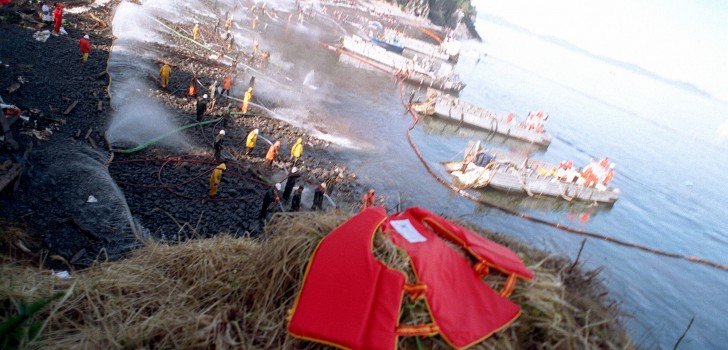U.S. scientists believe they have found a link between declining pink salmon and herring populations in Prince William Sound and the 1989 Exxon Valdez oil spill. In a report released by the National Oceanic and Atmospheric Administration (NOAA), researchers say they have found that embryonic herring and salmon exposed to even minute levels of crude oil had a tendency of developing heart defects.
The findings are significant as it has been over 25 years since the spill happened and yet the effects are just now starting to become apparent.
Research toxicologist at Seattle’s NOAA Fisheries’ Northwest Fisheries Science Center, John Incardona, said pink salmon and herring juveniles, which as embryos were exposed to crude oil, grew at a much slower rate and swam slower making it easier for predators to catch them.
“These juvenile fish on the outside look completely normal, but their hearts are not functioning properly and that translates directly into reduced swimming ability and reduced survival,” said Incardona. “In terms of impacts to shore-spawning fish, the oil spill likely had a much bigger footprint than anyone realized.”
The oil tanker Exxon Valdez struck a charted reef on March 24, 1989, pouring 11 million gallons of crude oil which contaminated large areas of shoreline spawning habitat of pink salmon and herring in Prince William Sound. Shortly after the environmental disaster, pink salmon stocks in the area declined and herring numbers collapsed. Herring is a key species in the marine food chain in the spill area, eaten by seabirds, salmon and marine mammals,
The report says that well into the 1990’s, scientists knew very little about how fish exposed to low-level crude oil were affected, especially in early life stages, and that even now, despite the report’s release, the question of how big an effect the Exxon Valdez spill had on fish, will remain controversial.
As part of their study, the NOAA scientists temporarily exposed salmon and herring embryos to low levels of crude oil and then placed them back into clean water. They found that “thresholds for harm were remarkably low,” leading them to believe the effects of the spilled oil from the Exxon Valdez was much worse than has been thought up to now.
The report said that records of water samples collected in 1989 during herring spawning season in Prince William Sound, 98 percent contained oil concentrations above the level which caused heart development abnormalities among herring in the study.
Leader of the NOAA’s Northwest Fisheries Science Center, Nat Scholz, said study researchers using swimming speed to measure fish cardiorespiratory fitness, determined fish exposed to the highest levels of crude oil were the slowest swimmers, making them the most vulnerable to predators.
“We now know the developing fish heart is exquisitely sensitive to crude oil toxicity, and that subtle changes in heart formation can have delayed but important consequences for first-year survival, which in turn determines the long-term abundance of wild fish populations,” he said.
Incardona said the study findings should help scientists to more accurately assess the effects of oil spills in the future.
Stay Connected